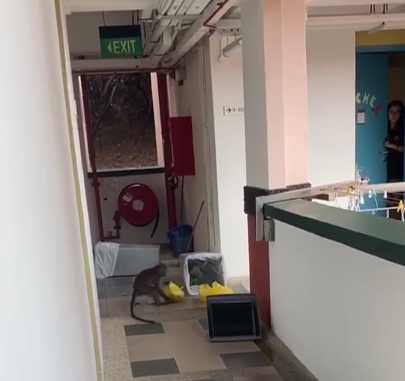- Encounters with monkeys include stolen toothpaste, dumpster divers and a chase over bananas
- Macaques can be attracted to food items they find while roaming around the campus
- Students are advised to keep food in closed opaque containers, shut doors and windows, keep at least three metres away from monkeys and avoid feeding them
When Hall 3 resident Daron Lau, 24, returned to his room after lunch on Aug 18, he found a monkey sitting outside his window eating his toothpaste.
The third-year Economics student, who had left the mosquito mesh open to ventilate his room said: “I was shocked when I came back and saw the monkey sitting outside my window on the drying railing.”
Lau shut the window quietly, wary that the monkey would come into his room. The monkey left shortly afterwards.
“It could have taken my laptop. I’m never ever going to open my window again,” he joked.
Stolen toothpaste, dumpster divers and a chase over bananas — these were among the highlights of students’ encounters with long-tailed macaques that have ventured on campus since August.
According to an email sent by the Residential Education (RE) Administrative Team, there has been a recent increase in the number of macaques crossing over from their jungle habitat and entering NTU’s Halls of Residence.
The monkeys were likely passing through residential areas while in search of a new troop to join, said Mr Joe Kam, senior wildlife management executive for the Animal Concern Research and Education Society (Acres).
Some of these monkeys can be attracted to food items they find while in transit, which encourages them to hang around to find more food, Mr Kam told Soapbox.
While Sociology student Elysia Tong, 20, waited for a campus rider bus near Hall 2 on Aug 20, she noticed a pair of macaques creeping up on her.
Their target — the bunch of bananas she held in her hand.
“I realised that they had gotten really close to me. I panicked and moved away but they followed,” said Tong, a Hall 14 resident.
The second-year student recalled that no one at the bus stop helped when they saw her trying to escape the monkeys.
“They were taking pictures of the monkeys instead,” she said, shaking her head.
She considered surrendering the bananas to the monkeys, but remembered an email guide from Acres sent to the student body in early August, which discouraged students from feeding the monkeys.
“I heard that it conditions them to rely on humans for food,” Tong said.
To her relief, the monkeys fled when a bus arrived moments later.

At Hall 9, second-year Communication Studies student Nicole Ong heard a commotion outside her room on Sep 8 just as she was about to take an afternoon nap.
“I heard really loud thumping sounds and screeching noises that didn’t sound quite human,” said Ong, 20.
“As soon as I went out, I found myself looking straight at a monkey sitting on my neighbour’s railing, rummaging through trash.”
Wildlife conservation group Jane Goodall Institute (Singapore) said in a webinar for students on Sep 5 that the macaques are rarely hostile to humans when unprovoked.
They reminded students to remain at least three metres from the monkeys and not to feed them as it would encourage them to approach more people for food.
Acres has advised residents to keep their windows and doors shut, and to keep food out of plain sight and in closed, opaque containers.
Mr Kam added that leftover food in bins can attract monkeys too.
“To avoid this from happening, NTU will have to make sure that everyone understands this and eliminate any possible food provision for our wild neighbours,” he said.
IMPORTANT CONTACTS
Acres Wildlife Rescue Hotline: 9783 7782
NTU Campus Security: 6790 5200




[…] macaques recently — the latest penchant among the university’s resident treetop thieves, typically known for snatching food […]